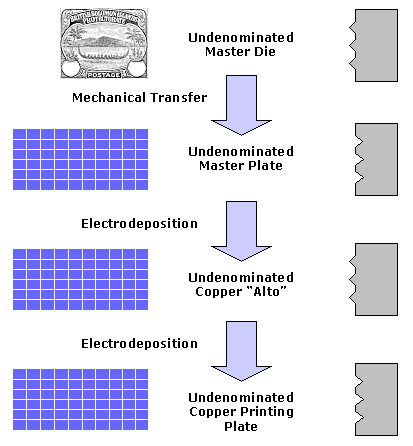 |
Production of the Issue |  |
| Unlike the Large Canoe issue that was produced by a philatelically-challenged printer resulting in a plethora of stamp-to-stamp differences, the Small Canoe issue is one of the finest examples of printing by the estimable Thomas De La Rue & Co. Ltd., one of the Commonwealth's most accomplished printers. The design was prepared by De La Rue's artist and was approved by the Crown Agents on March 31, 1908. The original design with approval notation is shown at right. |
From Gisburn |
||
| The printer prepared an undenominated master die that was used to produce a master plate by transfer. The master plate was, in turn, used to prepare a copper printing plate for each denomination by electrotyping. The values themselves were entered on the printing plate using the pantograph process. (Gisburn, Pemberton, and Purves.) | |||
 |
|||
|
|
The printing plates consisted of six rows of ten stamps in the normal Crown Agents size format, except horizontal rather than vertical. There were no plate numbers or imprint markings, but there were alignment crosses at the center on top, bottom, and both sides. | ||
| The paper for the first printing was supplied by Roughway Mills, Tonbridge, Kent. It was a medium thickness paper watermarked multiple crown and CA. The sheets were perforated 14 with a comb machine. |
|
||


